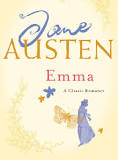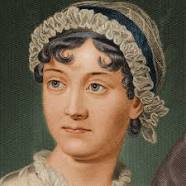Emma Page #22
Emma, by Jane Austen, is a novel about youthful hubris and the perils of misconstrued romance. The story takes place in the fictional village of Highbury and the surrounding estates of Hartfield, Randalls, and Donwell Abbey and involves the relationships among individuals in those locations consisting of "3 or 4 families in a country village". The novel was first published in December 1815 while the author was alive, with its title page listing a publication date of 1816. As in her other novels, Austen explores the concerns and difficulties of genteel women living in Georgian–Regency England; she also creates a lively comedy of manners among her characters and depicts issues of marriage, gender, age, and social status.
Harriet, she found, had never in her life been inside the Vicarage, and her curiosity to see it was so extreme, that, considering exteriors and probabilities, Emma could only class it, as a proof of love, with Mr. Elton's seeing ready wit in her. “I wish we could contrive it,” said she; “but I cannot think of any tolerable pretence for going in;--no servant that I want to inquire about of his housekeeper--no message from my father.” She pondered, but could think of nothing. After a mutual silence of some minutes, Harriet thus began again-- “I do so wonder, Miss Woodhouse, that you should not be married, or going to be married! so charming as you are!”-- Emma laughed, and replied, “My being charming, Harriet, is not quite enough to induce me to marry; I must find other people charming--one other person at least. And I am not only, not going to be married, at present, but have very little intention of ever marrying at all.” “Ah!--so you say; but I cannot believe it.” “I must see somebody very superior to any one I have seen yet, to be tempted; Mr. Elton, you know, (recollecting herself,) is out of the question: and I do not wish to see any such person. I would rather not be tempted. I cannot really change for the better. If I were to marry, I must expect to repent it.” “Dear me!--it is so odd to hear a woman talk so!”-- “I have none of the usual inducements of women to marry. Were I to fall in love, indeed, it would be a different thing! but I never have been in love; it is not my way, or my nature; and I do not think I ever shall. And, without love, I am sure I should be a fool to change such a situation as mine. Fortune I do not want; employment I do not want; consequence I do not want: I believe few married women are half as much mistress of their husband's house as I am of Hartfield; and never, never could I expect to be so truly beloved and important; so always first and always right in any man's eyes as I am in my father's.” “But then, to be an old maid at last, like Miss Bates!” “That is as formidable an image as you could present, Harriet; and if I thought I should ever be like Miss Bates! so silly--so satisfied--so smiling--so prosing--so undistinguishing and unfastidious--and so apt to tell every thing relative to every body about me, I would marry to-morrow. But between us, I am convinced there never can be any likeness, except in being unmarried.” “But still, you will be an old maid! and that's so dreadful!” “Never mind, Harriet, I shall not be a poor old maid; and it is poverty only which makes celibacy contemptible to a generous public! A single woman, with a very narrow income, must be a ridiculous, disagreeable old maid! the proper sport of boys and girls, but a single woman, of good fortune, is always respectable, and may be as sensible and pleasant as any body else. And the distinction is not quite so much against the candour and common sense of the world as appears at first; for a very narrow income has a tendency to contract the mind, and sour the temper. Those who can barely live, and who live perforce in a very small, and generally very inferior, society, may well be illiberal and cross. This does not apply, however, to Miss Bates; she is only too good natured and too silly to suit me; but, in general, she is very much to the taste of every body, though single and though poor. Poverty certainly has not contracted her mind: I really believe, if she had only a shilling in the world, she would be very likely to give away sixpence of it; and nobody is afraid of her: that is a great charm.” “Dear me! but what shall you do? how shall you employ yourself when you grow old?” “If I know myself, Harriet, mine is an active, busy mind, with a great many independent resources; and I do not perceive why I should be more in want of employment at forty or fifty than one-and-twenty. Woman's usual occupations of hand and mind will be as open to me then as they are now; or with no important variation. If I draw less, I shall read more; if I give up music, I shall take to carpet-work. And as for objects of interest, objects for the affections, which is in truth the great point of inferiority, the want of which is really the great evil to be avoided in not marrying, I shall be very well off, with all the children of a sister I love so much, to care about. There will be enough of them, in all probability, to supply every sort of sensation that declining life can need. There will be enough for every hope and every fear; and though my attachment to none can equal that of a parent, it suits my ideas of comfort better than what is warmer and blinder. My nephews and nieces!--I shall often have a niece with me.” “Do you know Miss Bates's niece? That is, I know you must have seen her a hundred times--but are you acquainted?” “Oh! yes; we are always forced to be acquainted whenever she comes to Highbury. By the bye, that is almost enough to put one out of conceit with a niece. Heaven forbid! at least, that I should ever bore people half so much about all the Knightleys together, as she does about Jane Fairfax. One is sick of the very name of Jane Fairfax. Every letter from her is read forty times over; her compliments to all friends go round and round again; and if she does but send her aunt the pattern of a stomacher, or knit a pair of garters for her grandmother, one hears of nothing else for a month. I wish Jane Fairfax very well; but she tires me to death.” They were now approaching the cottage, and all idle topics were superseded. Emma was very compassionate; and the distresses of the poor were as sure of relief from her personal attention and kindness, her counsel and her patience, as from her purse. She understood their ways, could allow for their ignorance and their temptations, had no romantic expectations of extraordinary virtue from those for whom education had done so little; entered into their troubles with ready sympathy, and always gave her assistance with as much intelligence as good-will. In the present instance, it was sickness and poverty together which she came to visit; and after remaining there as long as she could give comfort or advice, she quitted the cottage with such an impression of the scene as made her say to Harriet, as they walked away, “These are the sights, Harriet, to do one good. How trifling they make every thing else appear!--I feel now as if I could think of nothing but these poor creatures all the rest of the day; and yet, who can say how soon it may all vanish from my mind?” “Very true,” said Harriet. “Poor creatures! one can think of nothing else.” “And really, I do not think the impression will soon be over,” said Emma, as she crossed the low hedge, and tottering footstep which ended the narrow, slippery path through the cottage garden, and brought them into the lane again. “I do not think it will,” stopping to look once more at all the outward wretchedness of the place, and recall the still greater within.
Translation
Translate and read this book in other languages:
Select another language:
- - Select -
- 简体中文 (Chinese - Simplified)
- 繁體中文 (Chinese - Traditional)
- Español (Spanish)
- Esperanto (Esperanto)
- 日本語 (Japanese)
- Português (Portuguese)
- Deutsch (German)
- العربية (Arabic)
- Français (French)
- Русский (Russian)
- ಕನ್ನಡ (Kannada)
- 한국어 (Korean)
- עברית (Hebrew)
- Gaeilge (Irish)
- Українська (Ukrainian)
- اردو (Urdu)
- Magyar (Hungarian)
- मानक हिन्दी (Hindi)
- Indonesia (Indonesian)
- Italiano (Italian)
- தமிழ் (Tamil)
- Türkçe (Turkish)
- తెలుగు (Telugu)
- ภาษาไทย (Thai)
- Tiếng Việt (Vietnamese)
- Čeština (Czech)
- Polski (Polish)
- Bahasa Indonesia (Indonesian)
- Românește (Romanian)
- Nederlands (Dutch)
- Ελληνικά (Greek)
- Latinum (Latin)
- Svenska (Swedish)
- Dansk (Danish)
- Suomi (Finnish)
- فارسی (Persian)
- ייִדיש (Yiddish)
- հայերեն (Armenian)
- Norsk (Norwegian)
- English (English)
Citation
Use the citation below to add this book to your bibliography:
Style:MLAChicagoAPA
"Emma Books." Literature.com. STANDS4 LLC, 2025. Web. 1 Jan. 2025. <https://www.literature.com/book/emma_29>.




Discuss this Emma book with the community:
Report Comment
We're doing our best to make sure our content is useful, accurate and safe.
If by any chance you spot an inappropriate comment while navigating through our website please use this form to let us know, and we'll take care of it shortly.
Attachment
You need to be logged in to favorite.
Log In